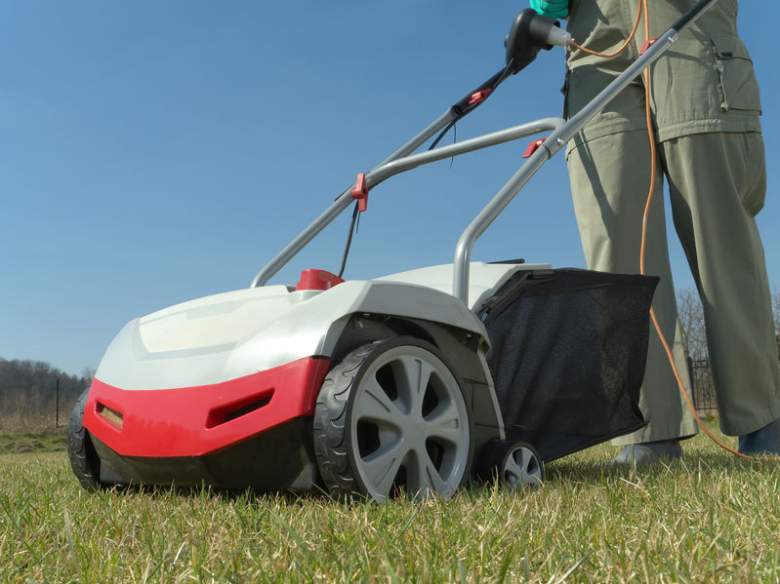
Thatch is a layer of organic material that forms in between the green grass shoots and the soil layer. It’s a natural process that consistently builds over time. As thatch gets thicker and denser, it can choke out your lawn and prevent your grass from absorbing proper levels of fertilizer and water through the roots.
A dethatcher, also known as a power rake, is important for periodic lawn maintenance but it’s important not to overdo it. Dethatching is about what to leave in as much as what to take out without harming the grass.
Along with regularly using a lawn mower and string trimmer, dethatching is a required step to make your grass look fantastic. Take a look at our list of lawn dethatchers below to decide what might be best for your lawn.
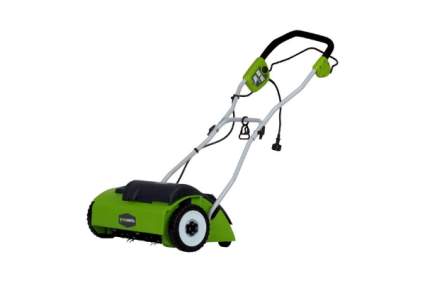
|
Amazon Customer Reviews
|
Price: $319.00 Shop at Amazon | Shop now Read our review |
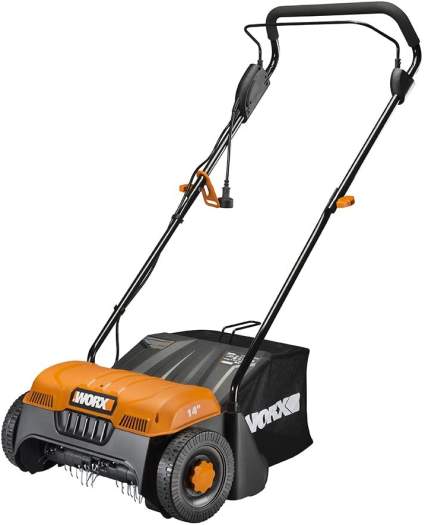
|
Amazon Customer Reviews
|
Price: $139.99 Shop at Amazon | Shop now Read our review |
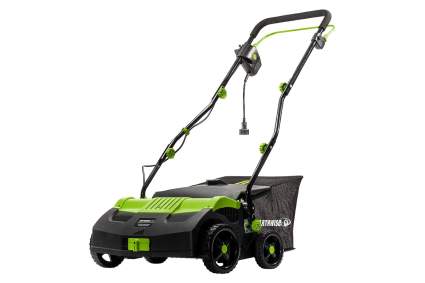
|
Amazon Customer Reviews
|
Price: $314.05 Shop at Amazon | Shop now Read our review |
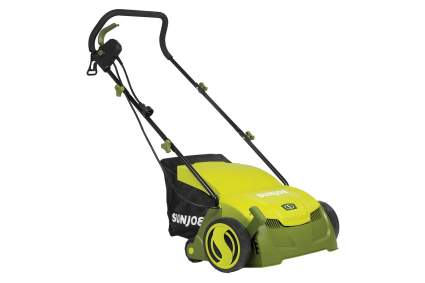
|
Amazon Customer Reviews
|
Price: $189.00 Shop at Amazon | Shop now Read our review |
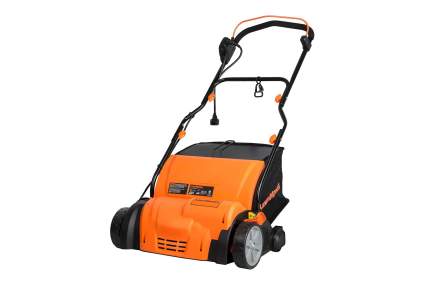
|
Amazon Customer Reviews
|
Price: $149.99 Shop at Amazon | Shop now Read our review |
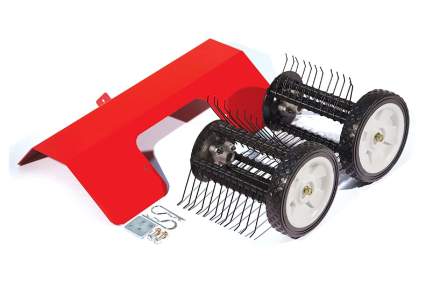
|
Amazon Customer Reviews
|
Price: $96.25 Shop at Amazon | Shop now Read our review |
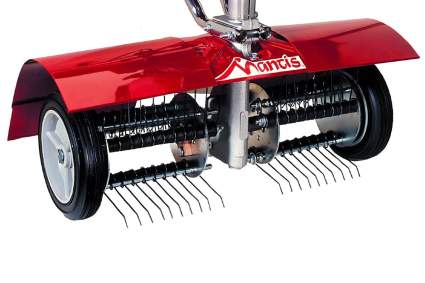
|
Amazon Customer Reviews
|
Price: $130.46 Shop at Amazon | Shop now Read our review |
-
1. Greenworks 27022 14-Inch 10 Amp Corded Dethatcher
Pros:- Stainless steel tines
- Three-position depth adjustment
- Four-year tool warranty
Cons:- Not as many depth adjustments as other models
- Assembly instructions aren't great; luckily it's easy to assemble
- Tines may rip out if you pull the dethatcher backward
This small yet mighty Greenworks 27022 14-Inch 10 Amp Corded Dethatcher is perfect for average-sized lawns. It features a 10 Amp motor, padded and adjustable handle, and a decent 14-inch dethatching path. The handle also includes a bale on/off switch for your convenience.
I’ve personally used this model and it worked beautifully on the highest setting. I was able to extract a small truckload of dead grass and organic material out of my lawn which is about a quarter of an acre. I planned out the route to work efficiently with the extension cord I used and it all worked great. Check out this great video showing how to dethatch your yard using the Greenworks 27022.
The dethatcher features three depth adjustments and nine stainless steel tines that won’t rust. It also comes with a full set of replacements for 18 tines total. While I personally didn’t have a challenge with the tines on the machine, I also took care not to pull the dethatcher backward and also to “wheelie” when I had to turn the machine around. Be careful with your new tool and you should be good for many uses.
The manufacturer recommends using a heavy-duty extension cord meant for the outdoors; this one here should work well for you.
Buy the Greenworks Dethatcher here.
-
2. Worx WG850 12 Amp 14-Inch Corded Electric Dethatcher
Pros:- 3,500 RPM no-load tine speed
- High torque 12 Amp motor
- Lock-off switch for safety
Cons:- Bag needs to be much, much larger to be effective
- Open sides of plastic wheels can get clogged with grass and stop rolling
- Bag tends to get bucked off easily
The Worx WG850 12 Amp 14-Inch Corded Electric Dethatcher, like the other corded machines on this list, will rip out dead grass better than you think a small electric machine would. Stainless steel tines whip around the drum at 3,500 RPM before sinking into a lawn and there are three different depths (-9mm, -3mm, +3mm) to suit your particular lawn thickness.
The WG850 will definitely take care of thatch, debris, and even roots with the 14-inch wide drum. A safety lock-off switch is a nice feature to save your toes. It’s a little smaller than the Greenworks model but not by much. It’s still a great way to maintain your lawn each year.
My only issue is with the collection bag. If you have a small strip or patch to handle, it’s totally fine but then do you really need to dethatch such a small area? Any sort of average sized yard is going to fill that bag in a heartbeat. Best to just leave it off and rake or mow the dead grass up afterward.
Find more Worx WG850 12 Amp 14-Inch Corded Electric Dethatcher information and reviews here.
-
3. Earthwise DT71613 16-Inch Corded Electric Dethatcher
Pros:- Next to no maintenance required
- Working depths from -0.4 inches to 0.4 inches
- 16-inch working width and four-gallon debris catcher
Cons:- Four gallons isn't much for capacity
- Replacement spring pins would be a nice pack-in
- Nice electric power but that cord might get in your way
The reliable DT71613 16-Inch Corded Electric Dethatcher from Earthwise is low-maintenance and easy to use, almost ridiculously so. It needs no oil or gas to function yet provides power comparable to a gas-powered model. Get rid of matted grasses and debris in the fall (not the spring!) with this lawn dethatcher to maintain your yard’s health throughout the year. The powerful 13-amp motor of this corded electric dethatcher is equipped with a bail wire switch for a safe start every time.
The 16″ working width is good to aerate and dethatch your grass effectively without having to make too many passes. The durable spring pins that do the actual dethatching work are made of zinc-plated piano wire. The four-gallon grass catcher might help you collect dead grasses and debris from your lawn but you might be better off employing a true lawn mower for that job.
No noxious fumes or noise means all this lawn tool needs is a live extension cord and it’s ready to go. Get on board the planet-saving train and improve the health of your lawn at the same time; consider picking up this great lawn dethatcher from Earthwise.
Find more Earthwise DT71613 16-Inch Corded Electric Dethatcher information and reviews here.
-
4. Sun Joe AJ801E 12 Amp 13-Inch Electric Lawn Dethatcher
Pros:- Efficient and effective
- Strong steel tines for maximum dethatching
- Super-easy assembly
Cons:- Feels and looks plasticky
- Requires long extension cord for any sort of mobility
- That collection bag is going to fill up quickly
First off, I must issue a disclaimer: I really enjoy the Sun Joe and Snow Joe product lines. They fill a niche for the American homeowner that no one else has really embraced and that niche is the wholly inexpensive yet effective yard tool. The Sun Joe AJ801E 12 Amp 13-Inch Electric Lawn Dethatcher doesn’t try to be anything it’s not; it’s simply happy to take care of your lawn on your time.
Best used for small to medium-sized lawns of less than half an acre, it has an electric-powered 12-amp motor with 24 spring steel tines to rake the thatch up and out of your grass. The tines are made of stainless steel and should stay sharp for many dethatching jobs in the future. Pass width is 12.6 inches which is small for a lawn dethatcher but that’s really not a big deal; you might lose ten minutes making up for the lost width.
The Sun Joe AJ801E features an instant start button (no shoulder-killing pull cords!) and a five-position control knob that adjusts the depth of your steel tines from 3mm below the soil to 9mm above the soil. Set your desired depth and hit the start button. That’s it.
This dethatcher comes with a collection bag, a nice touch, however, you’re going to find this is going to fill up quickly even on the highest depth setting. Do yourself a favor: dethatch your lawn then go over it all with your lawn mower. It’s much, much easier.
Sun Joe offers a two-year manufacturer’s warranty, also a nice touch. This is a corded electric power tool so you’ll need a long extension cord but if set up correctly in the first place, you’ll never notice you’re tethered to it.
Note: the Sun Joe people claim that this dethatcher also works as a “scarifier”; in truth, a dethatcher and a scarifier are the same thing. A scarifier simply gets down deeper into the soil to really clean out the dead material.
Find more Sun Joe AJ801E 12 Amp 13" Electric Lawn Dethatcher information and reviews here.
-
5. LawnMaster GV1314 Lawn Dethatcher
Pros:- 19 height positions
- Lightweight with a compact footprint
- Effective at a great price
Cons:- Tethered to an extension cord
- The collection bag fills up in no time whatsoever
- Tiny rear wheels
You’ve only got to dethatch your grass once at the year at the most, so picking up the LawnMaster GV1314 Lawn Dethatcher makes a lot of sense. Here’s why: the price is nice, it’s lightweight (just 31 pounds!), and it folds up on itself for tight, compact storage. But how does it do its job? Very well, thank you.
The GV1314 features a 3,700 RPM spinning drum as well as a 14-inch cutting width to get through your task quicker than you might think. There are also 19 height levels (!) to suit your particular terrain. This lawn dethatcher also can act as an aerator to get oxygen and nutrients straight to your grass. These inexpensive lawn dethatchers are not typically self-propelled because they don’t need to be. The GV1314 can be pushed easily across the turf and pull up all that dead grass.
Find more LawnMaster GV1314 Lawn Dethatcher information and reviews here.
-
6. Earthquake MC43 Cultlivator Dethatcher Attachment Kit
Pros:- Good gas-powered solution to dethatch the lawn
- Provides more use for a small garden cultivator
- Unique, less expensive solution for a gas dethatcher
Cons:- Needs a small cultivator to function
- Requires some mechancial proficiency to make it work
- Does not fit on every small cultivator
If you have both a lawn and a garden to take care of, it makes sense to have a cultivator and a dethatcher. This Dethatcher Attachment from Earthquake works with most small 2-cycle garden cultivators like the Earthquake 31452 33cc 2-Cycle MAC Tiller Cultivator. Cultivators are used for preparing and aerating soil, mixing soil additions, and weeding the garden.
With the dethatcher attachment, you can turn your mini cultivator into a lawn dethatcher easily. The Earthquake dethatcher attachment is easy to assemble and disassemble but does require some basic mechanical knowledge in order to use. This tool is lightweight compared with larger dethatchers and cultivators and is perfect for small to medium-sized yards.
Find more Earthquake MC43 Cultlivator Dethatcher Attachment Kit information and reviews here.
-
7. Mantis 5222 Power Tiller Dethatcher Attachment
Pros:- Works like a champ
- Quick installation
- Dethatches great when moving forward, even better when moving backward
Cons:- You need a Mantis or Echo tiller to use this
- May be overkill for small yards
- Expensive for what it is
Mantis tillers are some of the best in the business. People who own these little workhorses swear by their quality and effectiveness. If you own a 7000-series Mantis tiller, consider this Mantis 5222 Power Tiller Dethatcher Attachment,
For an average to large yard, this dethatcher is hard-working and durable enough to get the job done year after year. Tiller and cultivator attachments are a good idea. If you already have a tiller, you’re on the road to a more powerful tool that is able to take out more dead grass at a time than electric models.
This dethatcher attachment is compatible with any 7000-series Mantis tiller or cultivator. It attaches quickly and easily and can handle large yards with absolutely no problem. This dethatcher has the most tines of any on this list with 60 strong and flexible spring-steel picks to handle even the thickest thatch.
Find more Mantis 5222 Power Tiller Dethatcher Attachment information and reviews here.
Why Do I Need a Dethatcher?
Thatch is a natural part of your turf’s health. Thatch is a mixed layer of living and dead organic material including shoots, stems, and roots that sits in between the live grass blades and the soil layer. As this layer grows thicker and denser, roots begin to grow into the thatch itself instead of the soil.
Dethatchers are tools that use rake-like steel tines to slice through the thatch layer and remove some of it. They come in different forms: hand tools, attachments for your larger power tools or tractors, and full-sized machines that can be electric or gas-powered.
Dethatching should be done every year to prevent thatch from growing too thick. The best time for dethatching is fall or early winter, when the grass and thatch has gone through a full year of growth but before the soil freezes. Dethatching in the spring rips up turf that is often still dormant and will be unable to recover after winter injury, snow mold, and ice damage. It can also bring up noxious weed seeds and crabgrass to set your lawn up for a future infestation.
How Can I Identify Thatch Problems?
Thatch can cause problems in your lawn such as preventing it from absorbing enough water and fertilizer or trapping moisture and humidity that creates an advantage for fungi and mold. Brown grass is a clear sign that your grass isn’t getting enough water because of thatch.
Spongy lawns can be a sign of thatch as well. It may look healthy and green, but if you feel sponginess under your feet you may have a thatch issue.
Using a bulb planter or trowel, take a core sample of your lawn in several locations. Thatch will look like a brown or yellow layer in between the green grass and soil. Some thatch is good and should be present for a healthy lawn. If the layer is a half-inch thick or more, you have issues and should use a dethatcher.
Dethatching too much or too deeply thins and damages a normal lawn that isn’t typically needed. Many people feel it’s part of the annual spring clean-up as it helps clean up all the yard debris from the long winter. Unfortunately, the exact opposite is true.
If your lawn's thatch layer is over a half-inch, then take your dethatcher out and get to work. But do it in the fall when you don’t have to worry about wreaking havoc on young spring grass or causing weeds to germinate.
See Also: